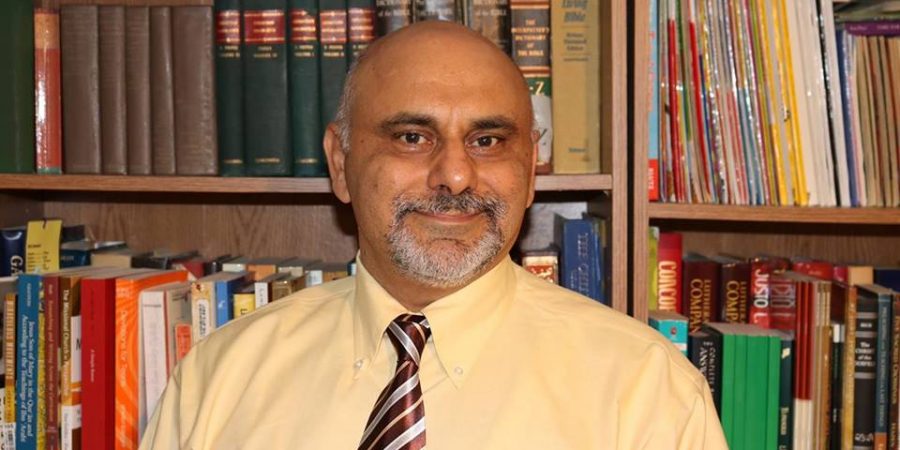And for the next fifty years, Christianity will remain a steady 33 to 34 percent of the world’s population. At the same time, however, Christians cannot accept the status quo...
Hesham Shehab: The Unfinished Task Abroad

THE UNFINISHED TASK ABROAD
The call for mission in the West and that of placing it predominantly in local congregations has not diminished the overall need and support for overseas mission. This is apparent from the statistical overview.
Therein they explain how Christianity will fare in the next fifty years. In AD 2000, the number of the unevangelized in the world actually had not changed much from 1976. And for the next fifty years, Christianity will remain a steady 33 to 34 percent of the world’s population. At the same time, however, Christians cannot accept the status quo; they must intensify the missionary task.
First, churches rarely deploy missionaries to areas where heavily non-Christian populations exist. Nine out of ten missionaries are sent out to work among peoples already contacted by the Christian message, and in some cases already heavily Christian. The result is that Christian mission concentrates more than 95 percent of its efforts in countries where local Christians could take on missionary tasks themselves. What is the solution?
Church bodies and their societies should deploy missionaries proportionally to the non-Christian and unevangelized populations in certain countries. Then the number of missionaries present in such countries would increase even as the number would decrease elsewhere. But even if churches were to change their strategy, two other factors—the human care issues and the worldwide resistance to Christianity—continue to significantly curb Christianity’s growth beyond 34 percent worldwide and would make the deployment of missionaries into unreached regions difficult.
The second factor that curbs Christianity’s growth and demands its resources is the social problems of this world among Christians and non-Christians alike. As a result, missionaries who are active in well-Christianized regions such as central and southern Africa will continue to reach not just the spiritually lost but also those in need of physical care. The twenty-first century, like the twentieth century, has incredible social problems among Christian and non-Christian populations alike. War, AIDS, environmental disasters, COVID-19, water shortages, child labor, and urban problems and other calamities continue to plague the world’s population. The third and final reason why Christianity has not grown beyond the level of 34 percent of the world population is because of non-Christian opposition to Christianity. The Evangelical Dictionary of World Missions starkly depicts the various forms of resistance:
Current estimates are that roughly 150,000 Christians are martyred each year, down from a peak of 330,000 prior to the demise of communist world powers. Some project that the numbers will increase to 600,000 by A.D. 2025, given current trends in human rights abuses and growth of militant religious systems, in particular, radical Islam.
Those inflicting contemporary Christian martyrdom include political regimes with counter-Christian agendas (e.g. official atheistic powers, such as China and the former Soviet Union); sociopolitical regimes enforcing religious restrictions (e.g. Egypt, Sudan); ethnic tribal regimes bent on eliminating minorities (e.g. Sudan, Rwanda, and Burundi); and religious regimes (e.g. Muslim countries in which Sharia is the official legal system).
MISSION AND OPTIMISM
As we look at these three factors that seem to curb Christian mission, it becomes difficult to share the expansionary optimism of those who
have and continue to envision total world evangelization. Christianity has voiced its optimism in this regard on repeated occasions. In 1910, at the time of the first World Mission Conference in Edinburgh, dignitaries and representatives made the visionary slogan of “evangelization of the world in this generation” their own, as many other conferences and revival meetings had done in preceding decades. Many Evangelical groups conceived of mission in unrealistically optimistic terms. Mission became a watchword for “scintillating missionary optimism,” an enthusiasm and belief in an unhindered and rapid Christian expansion and transformation of the world. Some of that optimism may have been the result of progressivism in the Romantic period before the Great War. Today, this optimism has surfaced again. In the late 1980s many denominations and movements prepared for global evangelization in the forthcoming decade (the 1990s), which they declared to be the decade of evangelism. Denominations and movements of every kind—whether Protestant, Evangelical, Ecumenical, Roman Catholic, or Pentecostal/Charismatic—launched global plans and made solemn pledges to complete Christ’s commission on earth in that decade. But the results of such campaigns were disappointing. The envisaged ten-year period of unstoppable expansion of Christianity did not materialize. Despite an overall increase in expenditure during that period (topping more than $70 billion), Christianity made no substantial progress.
Christianity should be realistic in terms of goals and obstacles in mission work. Here we would do well to limit our understanding and wisdom in light of God’s purpose and intentions: “Trust in the LORD with all your heart, and do not lean on your own understanding. In all your ways acknowledge Him, and He will make straight your paths” (Prov. 3:5–6). All the obstacles to mission—stark opposition, financial constraints, theological confusion about the actual nature of mission, etc.—gnaw at the confidence placed in our efforts. Although missionaries have access to improved technology and medicine to check many of the hazards that plagued foreign mission decades ago, other factors challenge mission. The gap between Western economic wealth and poverty in other countries is widening and creating obstacles for missionaries and their perceived identity and purpose. Additionally, the surge of new diseases and crime make mission today a precarious and daunting task. One thing needs to be stated as we look at the growth/decline and distribution of Christian populations. It is impossible to relocate missionary personnel to specific non-Christian countries. Careful consideration reveals that no country is exempt from receiving missionaries. The so-called “plum targets”—that is, countries with a higher concentration of Christian populations—might not be that plum after all. In fact, the post-Christian context in the West makes the situation extremely difficult for any missionary endeavor. Congregations and denominations may be more attracted to the so-called unreached areas of the world than to Western countries where the Gospel has been preached previously. Yet the configuration of Christian populations in the world is extremely volatile and not static; it may diminish or move on from one area to another, like a thundercloud shifts after it has dropped rain over a certain area. Christian mission is always on the move.
Hesham Shehab
Read more from Hesham Shehab… https://xpian.news/?s=hesham&submit=Search…

Hesham Shehab
Adjunct Faculty at College of DuPage, Formerly Adjunct Faculty at American University of Beirut and Pastor at Peace Lutheran Church Lombard, IL Name pronounciation: HI-shahm SHI-hab Hebrews 12: 4 & Philippians 1: 29




Comments are Closed